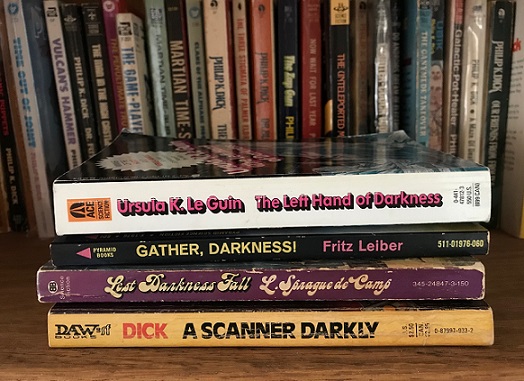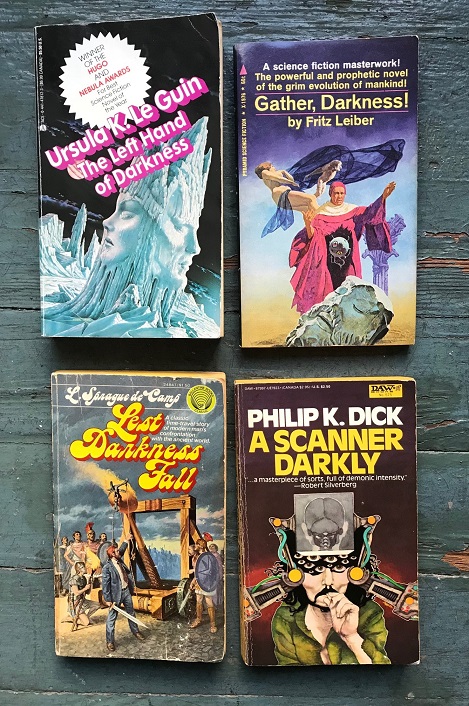Books acquired: “A Good Life: Newspapering and Other Adventures,” Ben Bradlee; “We’ll Always Have Casablanca,” Noah Isenberg; “Banking on Beauty: Millard Sheets and Midcentury Commercial Architecture in California,” Adam Arenson
Books read: “The Left Hand of Darkness,” Ursula K. Le Guin; “Gather, Darkness!” Fritz Leiber; “Lest Darkness Fall,” L. Sprague de Camp; “A Scanner Darkly,” Philip K. Dick
February was a dark month on the ol’ Reading Log, and not just because of Punxsatawney Phil, who predicted six more weeks of winter. (I don’t know how Pennsylvania is faring, but more winter has proved true for Southern California.) No, it was also a dark month because all four books had “dark” in the title.
Man, I had meant to read these precise books the past six years or so but didn’t get around to it, a testament to my deep backlog of unread books. “Lest Darkness Fall,” inspired by “A Connecticut Yankee in King Arthur’s Court,” has been waiting since I read Twain’s classic in April 2011.
(Incidentally, a couple of years ago I mentioned the title of Twain’s novel to a bookish friend in his mid-30s and he had never heard of it, nor could he wrap his mind around the title: “A what? Say that again. ‘A Connecticut’ what?” He broke up laughing. Huh.)
Anyway, this was a strong month. All four books were very good to excellent.
Le Guin’s 1969 novel has become a classic. (I owned it as a teen, sold it without ever attempting it in one of my frequent book purges, and bought it again a decade ago.) An emissary of a confederation of planets lands on one whose leaders either don’t believe him or see no reason to join up. The visitor slowly realizes how little he understands and how his prejudices are getting in the way of his own acceptance of these other-worlders, whose genders alter every month. A beautifully written, strangely enveloping novel.
Leiber’s 1950 novel is said to be his first good one. I admit I bought this ’60s copy because it was so well-preserved. A holy war between priests and witches isn’t what it seems on either side. Full of strong and slightly mysterious characters and visual writing. I read his “Best of Fritz Leiber” and “A Pail of Air” story collections in 2015 and became an admirer.
In de Camp’s 1941 novel, a scholar of the ancient world is hurled from the 20th century back to 6th century Italy, where he introduces innovations like the telegraph and “predicts” future events, and thus tries single-handedly to prevent the Dark Ages from falling. An early alternate-history novel, this owes a lot to Twain, but de Camp uses less satire, more plain humor and a deep knowledge of his subject. A lot of fun, and at 208 pages it gallops along quite unlike a lot of stately SF novels.
(By the way, Lyon Sprague de Camp once said he saw little need to write under an assumed name because his given name sounded more like a pseudonym than most pseudonyms.)
Finally, Dick’s 1977 novel, which was adapted for a 2006 film by Richard Linklater. I saw that movie and stuck my ticket stub inside the front cover of my unread copy. Nearly 12 years later, I finally read the book and used the stub as my bookmark.
In near-future Southern California, the drug Substance D is burning out the brains of the addicted, which is almost everyone, including those assigned to entrap them. One undercover agent is so undercover, he’s tasked with spying on himself, and that’s only one twist in this classic of paranoia, government surveillance and the dark side of the ’60s. Both absurdist and tragic, this late-period novel is one of PKD’s best and most personal.
These “dark” books made for an unusually strong month, as I said, one that leaves me lighter of spirit. It felt good to get all of these out of the way after intending so long to read them. Ditto with the “shadow”-titled books of January.
The de Camp came from Brand Books in Glendale in 2005, Dick from the annual Black Ace Paperback Show in 2004 and Le Guin from Ralph’s Comic Corner in Ventura a couple of years later. Thus, all of them fell into my hands in the first decade of this century.
That’s enough from me. How was your February, readers? Post away below.
Next month: a hornbook, a guidebook, and regular books too.


